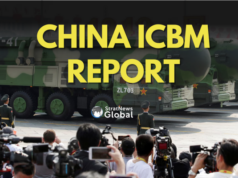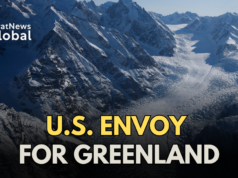U.S. National Security Adviser Jake Sullivan on Monday said the United States is finalizing steps to remove long-standing barriers to civil nuclear cooperation with Indian firms.
This move, described as a significant milestone, aims to deepen energy ties between the two nations and revive momentum in their landmark 2008 civil nuclear agreement. Speaking at the Indian Institute of Technology, New Delhi, Sullivan noted that these changes would allow Indian entities, previously restricted, to collaborate freely with U.S. firms and foster advanced technology exchanges.
Sullivan was in Delhi to co chair the Initiative on Critical and Emerging Technologies (iCET) with his Indian counterpart Ajit Doval. Launched in 2022, iCet has emerged as a central pillar of Indo-U.S. cooperation. Under this framework, both countries are focusing on quantum computing, artificial intelligence, 5G networks, and semiconductor manufacturing. These areas hold not just economic importance but also geopolitical significance, especially in the context of countering China’s technological dominance.
Sullivan, who also met other senior Indian leaders including Prime Minister Narendra Modi and External Affairs Minister Dr S Jaishankar emphasized the urgency of supply chain diversification, particularly in critical sectors like semiconductors and biopharma, where global dependencies on China have raised concerns. Through iCET, India and the U.S. aim to build resilient supply chains and foster innovation-driven partnerships.
Sullivan’s trip to India, his last as the Biden administration’s National Security Adviser, underscores the bipartisan consensus in the U.S. on strengthening ties with New Delhi. Most analysts believe that the incoming administration under President-elect Donald Trump is expected to maintain this trajectory, with a focus on countering China and bolstering technological and defense collaboration with India.
Others however, are a bit more cautious, and argue that given Trump’s unpredictable nature, it would be naive to assume this continuity without a clear confirmation from the incoming administration.
The Nuclear Deal
The 2008 India-U.S. Civil Nuclear Agreement was a historic turning point, ending decades of U.S. sanctions following India’s nuclear tests and recognizing India as a responsible nuclear state. While the deal promised access to civilian nuclear technology and energy cooperation, its implementation faced persistent hurdles, primarily due to India’s liability laws. These laws, which hold suppliers rather than operators accountable for damages in case of nuclear accidents, have been a deterrent for foreign investment.
Sullivan’s announcement indicates a renewed effort to resolve these challenges, including delisting certain Indian nuclear entities from U.S. trade restrictions. This policy shift not only removes bureaucratic obstacles but also reflects a broader strategic alignment between the two countries.
India’s energy demand is projected to grow significantly over the coming decades, with nuclear power being a vital component of its clean energy strategy. However, progress in expanding nuclear energy capacity has been slow. India has set ambitious goals, such as achieving 20,000 MW of nuclear power capacity by 2030, but stringent liability norms have delayed agreements with international suppliers.
By easing restrictions, the U.S. is paving the way for the deployment of advanced reactors and technologies in India, which could help meet its energy needs sustainably. This also aligns with global climate goals, as nuclear energy offers a low-carbon alternative to fossil fuels.
The deepening partnership also reflects shared concerns over China’s assertive actions in the Indo-Pacific region. Sullivan’s visit comes at a time of heightened India-China tensions, including disputes over water resources and infrastructure projects along the Himalayan borders. The U.S. views India as a vital partner in maintaining a rules-based order in the region, complementing initiatives like the Quad.
Moreover, as Sullivan pointed out, democratic nations are increasingly aware of how economic interdependencies can be weaponized, reinforcing the need for strategic alliances that prioritize shared values and interests.
Sullivan’s announcement on civil nuclear cooperation and the broader strategic dialogue with India signal a deepening of ties between the two democracies. While significant progress has been made, challenges such as aligning liability frameworks, ensuring technology transfer, and navigating regional dynamics remain.
As both nations look to the future, their ability to translate dialogue into actionable outcomes will be crucial. The Indo-U.S. partnership, built on shared democratic values and strategic interests, has the potential to shape global energy security, technological innovation, and regional stability in the coming decades.
But as one Indian analyst pointed out, “a lot will depend on whether incoming President Trump agrees with this argument. Given his clearly condescending attitude towards clean energy and climate change, we should not assume that it is a done deal.”
In a career spanning three decades and counting, Ramananda (Ram to his friends) has been the foreign editor of The Telegraph, Outlook Magazine and the New Indian Express. He helped set up rediff.com’s editorial operations in San Jose and New York, helmed sify.com, and was the founder editor of India.com.
His work has featured in national and international publications like the Al Jazeera Centre for Studies, Global Times and Ashahi Shimbun. But his one constant over all these years, he says, has been the attempt to understand rising India’s place in the world.
He can rustle up a mean salad, his oil-less pepper chicken is to die for, and all it takes is some beer and rhythm and blues to rock his soul.
Talk to him about foreign and strategic affairs, media, South Asia, China, and of course India.




